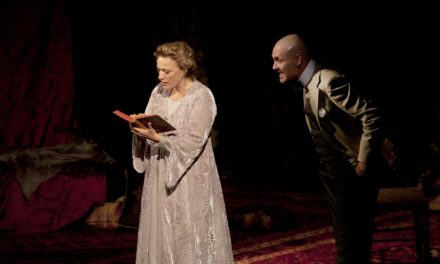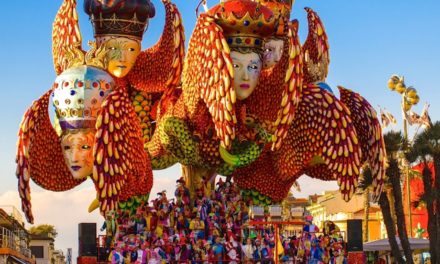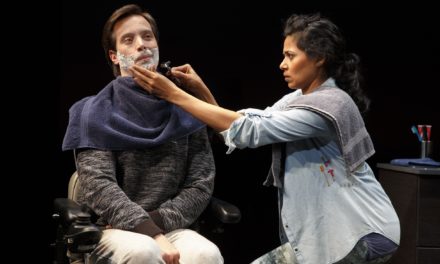The city of Milan hosts two annual Fringe events, the first in June, and the second, in late September and early October. I caught the latter, Fringe Milanooff, situated in forty different venues scattered around the city in theatres and site-specific settings. This year’s festival is hosting 52 companies, the majority of which are from Italy, besides a handful from Switzerland, Ukraine and Scotland. Since its debut in 2016, directors Renato Lombardo and Francesca Vitale have successfully increased the number of shows and collateral events, developed a sister fringe in Catania, Sicily, and made connections with other Fringes worldwide. 2024 marks the 700th anniversary of Marco Polo’s death, and this iconic Venetian explorer, merchant and writer is celebrated in the theme of this year’s Fringe, “The Journey”. One play In the Name of Profit (Col nome del guadagno), written and performed by Beppe Allocca, engaged fully with this leitmotiv. In the beautiful, historic building and gardens of the Umanitaria, a well-known, downtown cultural hub, dating back to the late 19th century, Allocca presented the figure of Francesco di Marco Datini (1335-1410), known as “The Merchant of Prato” (Prato is a city near Florence); Datini traded with different parts of Europe, setting up what could be thought of as the first ‘holding company’, to use a contemporary term. The stage is empty, except for an antique armchair, surrounded by hefty old tomes, suggesting Datini’s account books. Dressed in a long velvet robe, this writer-performer proceeds to tell the merchant’s story, every so often making topical allusions to present-day trading. Allocca is clearly steeped in the history of Prato, his home city, where he works as as an artisan in a longstanding family business specialised in recycling textiles, and he deliberately uses the term, ‘theatrical artisan’, to define his work for the stage. In the role of Datini, Allocca kicks off by reading from one of the account books, where the Merchant’s religious beliefs are manifest alongside his business deals and money lending. In another scene, Allocca steps out of role, inviting the audience to imagine, when he speaks directly to them, that they are hearing letters which the Merchant of Prato addressed to clients in Florence, Pisa, Genova, Avignon and Barcelona, whereas when he looks to the right, he is addressing shoppers in Datini’s emporium, which stocked the recently imported goods. Allocca deftly conjures up the conversations in what is a busy shop, where customers express their excitement at finding newly imported goods, while the letters carry us to different places around Europe, revealing Datini’s wit and business acumen. The stage narrative is at times accompanied by an evocative video, which casts Allocca in the role of a contemporary visitor to Prato. Unfolding in the heart of historic Prato, the film adds a dimension of realism to the story as Allocca interacts with Datini’s statue, as well as visiting his medieval house. A visit to the cellars introduces a narrative gem; it was here in the 19th century that 150 thousand documents written by Datini were uncovered probably by an Archdeacon. These chart the Merchant of Prato’s business and charitable activities, including the fact that on his death, he left his entire estate to the poor of Prato. Beppe Allocca’s charismatic stage presence, bubbly good humour, and lively Tuscan patter, makes this show both highly entertaining and instructive, uncovering as it does a remarkable figure from Medieval Tuscany.

In the Name of Profit (Col nome del guadagno). Written and performed by Beppe Allocca. Milano Fringe Off 2024.
This post was written by the author in their personal capacity.The opinions expressed in this article are the author’s own and do not reflect the view of The Theatre Times, their staff or collaborators.
This post was written by Margaret Rose.
The views expressed here belong to the author and do not necessarily reflect our views and opinions.


















